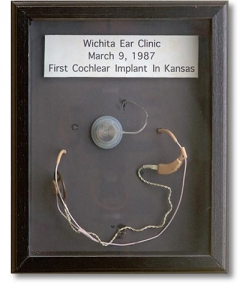You may be a candidate for a cochlear implant if your speech understanding is less than 50% while wearing hearing aids. To determine if you are a cochlear implant candidate, we recommend having a cochlear implant evaluation.
We will perform a comprehensive hearing assessment both with and without amplification.
After testing is completed, you will meet with an audiologist who will tell you about your options and show you the different types of processors from each cochlear implant company. You will also meet with a Speech Language Pathologist who may assess cognitive function. The audiologist and SLP will also help you establish realistic expectations for your results and answer any questions you may have.
You will also need to meet with a neurotologist (ear surgeon/specialist) who will give you an otologic exam, discuss the surgery, answer questions, and order and review a CT scan.
Occasionally, you will be required to obtain medical clearance from your general practitioner or other specialists you see in order to verify you are healthy enough for surgery.

 Wichita Ear Clinic began their cochlear implant program in 1987 when we implanted the first recipient in the state of Kansas. We have implanted individuals ranging in age from infants to geriatrics. Our Cochlear Implant Team consists of 2 neurotologists, 2 audiologists and a speech language pathologist (SLP). Wichita Ear Clinic is proud to work with two major cochlear implant manufacturers: Advanced Bionics and Cochlear Nucleus.
Wichita Ear Clinic began their cochlear implant program in 1987 when we implanted the first recipient in the state of Kansas. We have implanted individuals ranging in age from infants to geriatrics. Our Cochlear Implant Team consists of 2 neurotologists, 2 audiologists and a speech language pathologist (SLP). Wichita Ear Clinic is proud to work with two major cochlear implant manufacturers: Advanced Bionics and Cochlear Nucleus.